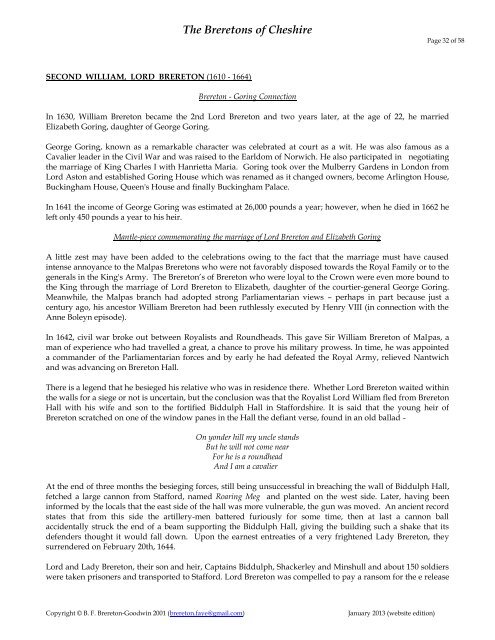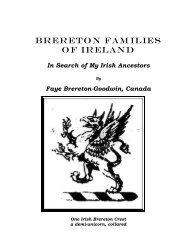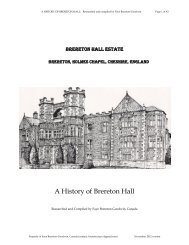Create successful ePaper yourself
Turn your PDF publications into a flip-book with our unique Google optimized e-Paper software.
<strong>The</strong> <strong>Breretons</strong> <strong>of</strong> <strong>Cheshire</strong><br />
SECOND WILLIAM, LORD BRERETON (1610 - 1664)<br />
Brereton - Goring Connection<br />
Copyright © B. F. Brereton-Goodwin 2001 (brereton.faye@gmail.com) January 2013 (website edition)<br />
Page 32 <strong>of</strong> 58<br />
In 1630, William Brereton became the 2nd Lord Brereton and two years later, at the age <strong>of</strong> 22, he married<br />
Elizabeth Goring, daughter <strong>of</strong> George Goring.<br />
George Goring, known as a remarkable character was celebrated at court as a wit. He was also famous as a<br />
Cavalier leader in the Civil War and was raised to the Earldom <strong>of</strong> Norwich. He also participated in negotiating<br />
the marriage <strong>of</strong> King Charles I with Hanrietta Maria. Goring took over the Mulberry Gardens in London from<br />
Lord Aston and established Goring House which was renamed as it changed owners, become Arlington House,<br />
Buckingham House, Queen's House and finally Buckingham Palace.<br />
In 1641 the income <strong>of</strong> George Goring was estimated at 26,000 pounds a year; however, when he died in 1662 he<br />
left only 450 pounds a year to his heir.<br />
Mantle-piece commemorating the marriage <strong>of</strong> Lord Brereton and Elizabeth Goring<br />
A little zest may have been added to the celebrations owing to the fact that the marriage must have caused<br />
intense annoyance to the Malpas <strong>Breretons</strong> who were not favorably disposed towards the Royal Family or to the<br />
generals in the King's Army. <strong>The</strong> Brereton’s <strong>of</strong> Brereton who were loyal to the Crown were even more bound to<br />
the King through the marriage <strong>of</strong> Lord Brereton to Elizabeth, daughter <strong>of</strong> the courtier-general George Goring.<br />
Meanwhile, the Malpas branch had adopted strong Parliamentarian views – perhaps in part because just a<br />
century ago, his ancestor William Brereton had been ruthlessly executed by Henry VIII (in connection with the<br />
Anne Boleyn episode).<br />
In 1642, civil war broke out between Royalists and Roundheads. This gave Sir William Brereton <strong>of</strong> Malpas, a<br />
man <strong>of</strong> experience who had travelled a great, a chance to prove his military prowess. In time, he was appointed<br />
a commander <strong>of</strong> the Parliamentarian forces and by early he had defeated the Royal Army, relieved Nantwich<br />
and was advancing on Brereton Hall.<br />
<strong>The</strong>re is a legend that he besieged his relative who was in residence there. Whether Lord Brereton waited within<br />
the walls for a siege or not is uncertain, but the conclusion was that the Royalist Lord William fled from Brereton<br />
Hall with his wife and son to the fortified Biddulph Hall in Staffordshire. It is said that the young heir <strong>of</strong><br />
Brereton scratched on one <strong>of</strong> the window panes in the Hall the defiant verse, found in an old ballad -<br />
On yonder hill my uncle stands<br />
But he will not come near<br />
For he is a roundhead<br />
And I am a cavalier<br />
At the end <strong>of</strong> three months the besieging forces, still being unsuccessful in breaching the wall <strong>of</strong> Biddulph Hall,<br />
fetched a large cannon from Stafford, named Roaring Meg and planted on the west side. Later, having been<br />
informed by the locals that the east side <strong>of</strong> the hall was more vulnerable, the gun was moved. An ancient record<br />
states that from this side the artillery-men battered furiously for some time, then at last a cannon ball<br />
accidentally struck the end <strong>of</strong> a beam supporting the Biddulph Hall, giving the building such a shake that its<br />
defenders thought it would fall down. Upon the earnest entreaties <strong>of</strong> a very frightened Lady Brereton, they<br />
surrendered on February 20th, 1644.<br />
Lord and Lady Brereton, their son and heir, Captains Biddulph, Shackerley and Minshull and about 150 soldiers<br />
were taken prisoners and transported to Stafford. Lord Brereton was compelled to pay a ransom for the e release




